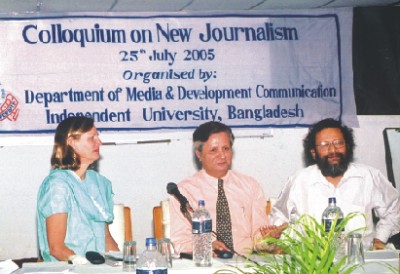'Narrative journalism has great potential'
Staff Correspondent
There is a great potential and a noticeable trend in Bangladesh to adopt narrative form of journalism, said Associate Professor of The George Washington University Janet E Steele yesterday."It is more applicable to the newspapers in the age of competition with television journalism," she said at a seminar on 'New Journalism', organised by the Independent University, Bangladesh in the city. But this does not mean that narrative journalism is going to replace the existing trends and techniques of conventional journalism altogether, said the American academic. There should not be any confusion that narrative journalism too deals with news and it's not a fiction anyway, she added. "New journalism is rather narrative in form and it's not literary journalism," Janet said, "It's not a marriage between fiction and journalism, it's just a form of journalism." A distinctive aspect of new journalism is that it broke away from obsession with objectivity in conventional journalism, placing emphasis on subjectivity in reporting and other genres of journalism, she said. "By now, narrative journalism has moved out of the feature section to news section." Four distinctive features of narrative journalism include scene by scene description, extensive use of dialogues, multiple points of views and credible attention to details in reporting. That new journalism has gained popularity today is due to different shortcomings of the conventional journalism as readers today long for in-depth reports with vivid details, said Dr Ahaduzzaman M Ali, a professor of journalism at Dhaka University. "Though new journalism seems to be fictional, it's actually an in-depth reporting for a greater truth," he said, adding that it is sometimes criticised as literary paranoia and para-journalism. This form of journalism reflects the reporter's honest participation with the event and in-depth description, he said. Traditional approach of journalism with all its superficiality and constraints cannot address all the grave problems, he added. The new journalism was pioneered by renowned US journalists like Tom Wolfe and Jimmy Breslin in 1960s in the USA, said Dr Ali. Works of Daniel Defoe, Mark Twin and George Orwell manifest elements of new journalism, he said. IUB Vice-chancellor Prof Bazlul Mobin Chowdhury, faculty members and students attended the seminar.
|

The Independent University, Bangladesh organised a seminar on 'New Journalism' in the city yesterday, with Janet E Steele, left, associate professor of The George Washington University, as the key speaker |